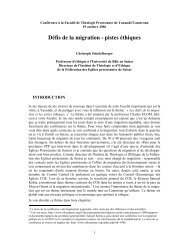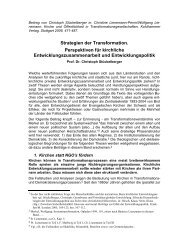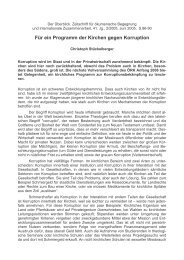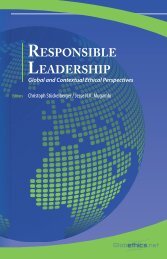BREAK THE CHAINS OF OPPRESION AND THE YOKE OF ...
BREAK THE CHAINS OF OPPRESION AND THE YOKE OF ...
BREAK THE CHAINS OF OPPRESION AND THE YOKE OF ...
You also want an ePaper? Increase the reach of your titles
YUMPU automatically turns print PDFs into web optimized ePapers that Google loves.
HopE<br />
guage: ‘In the name of peace and security, the global empire is exercising ‘omnipotent’<br />
power through its military weapons systems of mass destruction and its<br />
intensive, totalistic warfare. Already, wars such as the Crusades, the conquest of<br />
the Americas, and the colonial wars against the racial and ethnic peoples in Asia<br />
and Africa have caused massive victimization of peoples. This historical process<br />
of systematic, massive conquest and destruction of people and the earth has extended<br />
into modern times. World Wars I and II, the US atomic bombing of the<br />
Korean and Japanese peoples, the US Cold Wars against the Korean and Vietnamese<br />
people, and the Kosovo, Afghanistan and Iraq wars against those people<br />
and their communities have evolved into total wars of omnicide. Current developments<br />
by the empire in global militarization threaten the total destruction of<br />
earth as a living abode. The nature of war has been radically transformed into<br />
limitless war in time and space under the geo-politics of global empire. But the<br />
omnipotent power of empire can never obtain ‘total security’. Its absolute power<br />
through modern military technocracy – omnicidal weapons systems and the<br />
claim of omnipotent power – constitutes a tyranny over all living beings’. 14<br />
The paradigm of ‘empire’ is not very helpful in developing a theology of hope in<br />
times of globalization. First of all because the paradigm is too simplistic in its approach<br />
towards reality. In this perspective it does not account for opposite interests<br />
among the players on the global market. It does not discern between the interests<br />
of the state and that of bankers, of that of shareholders and entrepreneurs.<br />
It does not take into account the growing influence of emerging new economies<br />
(India, China). It seems to be blind towards the ‘neo-colonial’ behavior of e.g.<br />
China in Africa. And more important, it does not provide a critical attitude towards<br />
nepotism, corruption and ethnic conflicts in other contexts outside the<br />
USA. Unless ‘empire’ � is �to blame � for all evil in �this world. � That presupposition<br />
however is not taking into account the role of the individual and his responsibility.<br />
Finally: it is too simplistic a conclusion to look upon evil as something that<br />
has only one origin and centre: the United States of America.<br />
Theology of hope in the context of globalization<br />
The apocalyptic and transcendent shape of ‘empire’ does not leave much space<br />
for (a theology of) hope. We either have to withdraw from this world and disengage<br />
from daily life, or we have to engage in creating a universal revolution. As<br />
‘empire’ is omnipresent, the battle against this apocalyptic beast has to be universal<br />
as well. It does not only include the battle against the driving forces of liberal<br />
capitalism, it also has to fight Western Christianity as its ally: “Western Christi-<br />
14 http://warc.jalb.de/warcajsp/side.jsp?news_id=809&part_id=0&navi=6<br />
�����������������������������������������<br />
� � � � � � � �������������������<br />
�<br />
64<br />
– <strong>THE</strong>OLOGY <strong>OF</strong> HOPE IN TIMES <strong>OF</strong> GLOBALIZATION –










